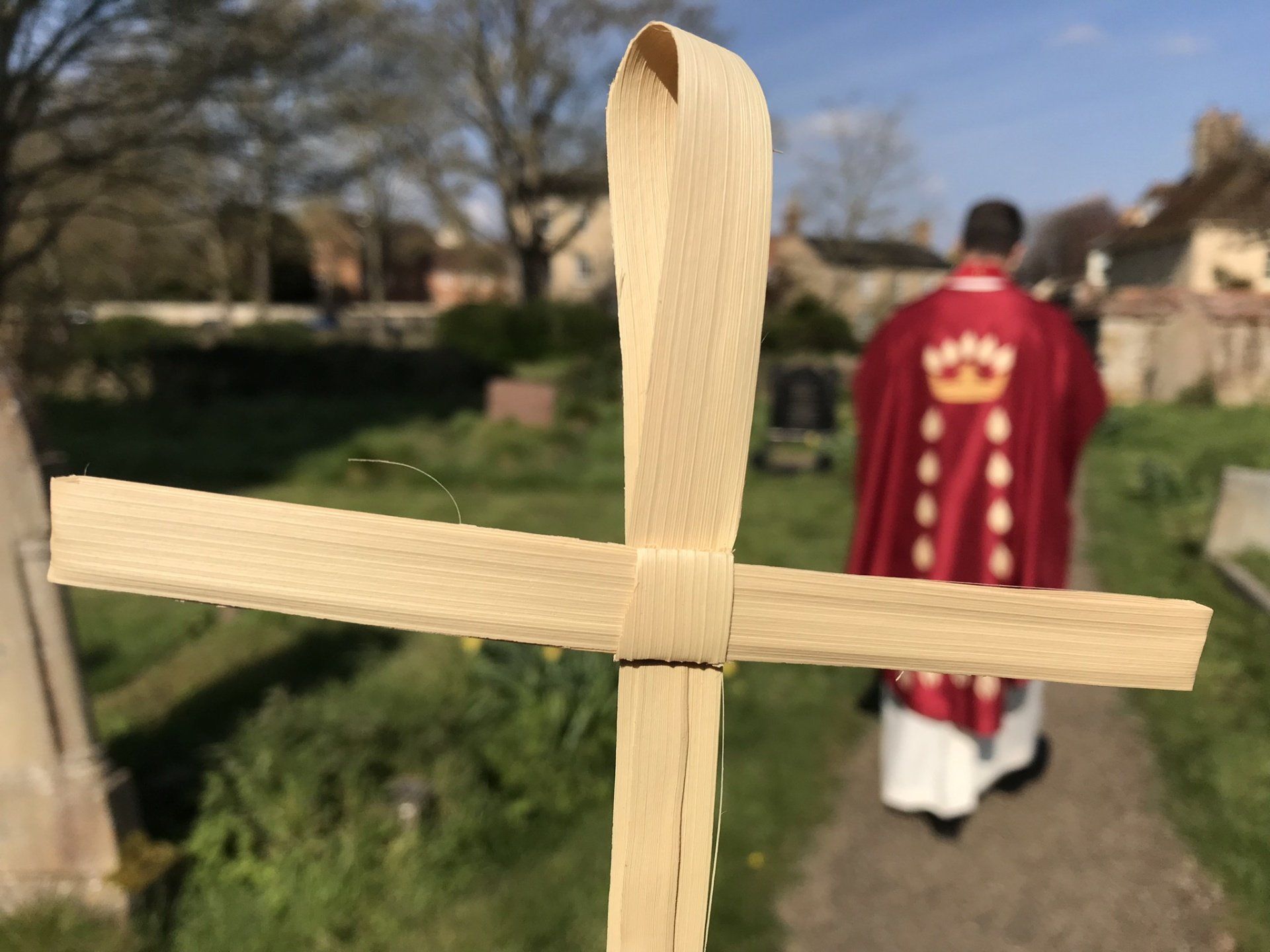The Fickle Crowd
The lessons of Palm Sunday for the twenty first century

Every
Palm Sunday in my local town of Olney, our congregation commemorates Jesus’s triumphal entrance into
Jerusalem, by parading in the town singing songs of praise - an act of uncommon witness in a town where
faith tends to be expressed more discreetly within church walls.
My kids always loved this day – particularly because we used to be accompanied by a real live donkey. To be honest, I think the donkey was more of a draw than the worship, but Jesus’s choice of mount was very important to this story as it was a direct fulfilment of the Old Testament prophecy from Zechariah:
‘See your king comes to you
Gentle and riding on a donkey.
On a colt the foal of a donkey.’ (Zech 9:9)
In Luke we are told that Jesus specifically sought out a colt, the foal of a donkey for his entry into the holy city – and the crowd would not have missed the significance of this action.
I am not sure what happened to Olney’s donkey - it hasn’t accompanied us for the last few years - but even without the donkey our Palm Sunday remembrance is an exuberant event.
As we parade, I can almost imagine the excitement of the people of the Jerusalem. They had heard so much about this man Jesus, who had been preaching around the surrounding countryside and performing such miracles - giving the blind their sight, the deaf their hearing, the lame, mobility - and was even rumoured to have raised his friend Lazarus from the dead.
Everyone was desperate to get a glimpse of this man who some were saying was the long awaited Messiah. Certainly he fulfilled some of the key criteria. He was reportedly the illegitimate offspring of a young teenager who claimed to be a virgin (as Isaiah prophesied). He was born in Bethlehem (as predicted by Micah) and was from the line of David (as prophesied again in Isaiah). He had also openly linked his own ministry to Isaiah’s prophesy that the Messiah would:
‘Preach the good news to the poor
Proclaim freedom for prisoners
Recovery the sight of the blind
Release the oppressed
And proclaim the year of the Lord’s favour.’ (Isaiah 61:6)
. . . And of course there was that donkey.
So it was no wonder that the crowds turned out in such force and what they shouted that day was really significant.
The Bible records that the crowds shouted Hosanna - an acclamation of praise more usually reserved for God. Hosanna is a liturgical word and in the Old Testament usually appears in relation to prayers for salvation and help from the Lord. And on that day the crowd shouted ‘Hosanna to the Son of David’ – a reference to that prophecy that the Messiah would come from the line of David. It was a time of great expectation and excitement.
At that moment the mob were carried up in a wave of enthusiasm and were willing to believe that this was indeed the promised Messiah, sent to restore the Kingdom of Israel. But therein lies the rub – because this restoration meant different things to different people. And while the crowd may have been caught up in the fervour of the moment, some may have been excited for the wrong reasons.
Old Testament prophecies indicated that the Messiah would be to destroy Israel’s enemies, restore the kingdom of Israel, extend it over the whole world and, in a final battle, the enemies of God will be destroyed.
Some wished the Messiah to pursue violent military goals in order to overthrow the Romans Empire and to reestablish the kingdom of Israel – and so widespread was this belief that Jesus even had a zealot within his own ranks who would go on to betray him. So Jesus’s choice of mount was very significant. While it fulfilled Zechariah’s prophecy, it also confounded a lot of the expectations that people had of the Messiah.
Kings usually went into battle on strong horses, but instead Jesus road a ‘lowly donkey’, an animal constitutionally unfit for battle and a traditional symbol of peace. In amidst all the excitement, you can imagine some of the more fervent zealots beginning to have second thoughts; to feel let down that Jesus wasn’t the expected battle leader.
But of course Jesus already knew all this. Having entered Jerusalem, he had gone to the temple, and in fury had turned out those who were trying to make a profit by selling sacrifices, and in the following days he would return to the temple to preach. And it was here that he told the parable of the tenants.
This parable tells the story of a man who planted a vineyard and leased it out to tenants who he left to get on with tending the land. The agricultural image of a vineyard and this kind of arrangement would have been very familiar to the crowd gathered to listen to Jesus, but the chief priests and teachers of the law who were also in the crowed would have also known the vine as an Old Testament symbol for Israel.
The owner of the vineyard, naturally, expected his share of the harvest and when the time came he sent a slave to collect. But the ungrateful tenants beat him and sent him away. So the owner sent a second and even a third slave, but they were only beaten and insulted. But the owner did not give up and, in despair at his errant tenants, sent his beloved son, saying ‘perhaps they will respect him’. But instead when the son came among them, they rejected him and killed him.
The owner is, of course, God, the slaves are the prophets, whose predictions the crowds believed they were seeing fulfilled only a day or so before when Jesus entered Jerusalem and the beloved son, of course, is Christ himself.
Jesus knew that the crowd that greeted him on that fateful Sunday were fickle; that when he did not live up to their misguided expectations of what the Messiah would be like, that they would reject him and ultimately kill him in the most terrible way imaginable.
So this parable both looks both backwards and forwards. It looks back to the prophets who predicted the coming of the Messiah and backlash that they received often from their own people. And it looks forward to the events of Holy Week, when, despite the acclamation of the mob on Palm Sunday, would see the man they acclaimed as the Messiah, rejected, humiliated, beaten and killed.
It is very easy to condemn the crowds in Jerusalem who only a few days later were baying for his blood, but it is worth reflecting how easy it is to be caught up with mob mentality.
How often do we laud our leaders until they fail to deliver as we expect? How often do people become caught up in a wave of anger and hatred when they feel that we have been let down? Look for example at the baying mobs outside parliament at the moment, some of whom have verbally assaulted leaders who were once elected by the public. Look at the hatred being piled up on certain leaders in social media – leaders who were once praised. How often in the limbo of Brexit have we expressed our frustration in dehumanising terms. Humanity hasn’t changed that much in the last 2,000 years has it?
But there is an epilogue to this damming parable. As the tenants nailed the landowners son to a cross of wood and raised him up to die, he said ‘Father forgive them for they know not what they do.’ So great was the love of the landowner, that it overcame this terrible death inflicted on his son, and on the third day the son rose again, and now sits at the right hand of the landowner, interceding on our behalf as we seek his forgiveness.
And one day the son will come again, and entry will be so triumphal that the whole world will kneel before him and will say ‘Blessed is he who comes in the name of the Lord.’
Kate Nicholas’s best-selling memoir Sea Changed (shortlisted as Christian Biography of the Year 2017) and her latest book Sea Changed: A Companion Guide – Living a Transformed Life are available at Christian bookstores and Waterstones throughout the UK and online at eden.co.uk and Amazon worldwide. Her recent TV series Living a Transformed Life can be viewed on demand on www.tbnuk.org or at www.katenicholas.co.uk.
